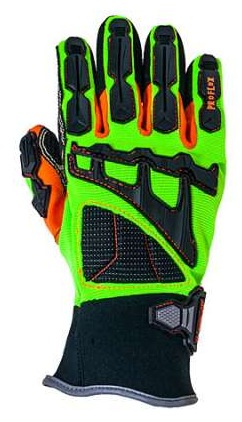Employers these days are moving away from generalization and placing an emphasis on hiring workers who have specialized skills. According to Forbes magazine, people without specialized skills are finding it harder and harder to find work.
Just like the trend toward needing specialized skills, there is a trend toward needing specialized work gloves. More than anything, it was a court case that demonstrated this need. Recently in the UK, a city sanitation worker successfully sued his employer and was awarded more than $150,000 in personal injury damage, for a cut he suffered at work while sifting through a pile of trash. The employee was wearing gloves provided by his employer when he cut himself on a sharp object hidden in the pile of trash, but the court ruled that his employer had provided him with “the wrong type of gloves.” The court found that since there was indeed a real probability of sharp objects being found in the trash, the only way to control that risk would be to provide suitable and effective cut-resistant gloves — suitable and effective being the important words. The type of protection needs to fit the type of work being done.
The court case in the UK was just one example of a larger issue. According to the National Safety Council, there are 3.4 billion work-related injuries every year, and $156.2 billion spent every year on those injuries. Almost 80 percent of these injuries involve the hands, which just goes to show the strong need for appropriate task-specific, and in this case, cut-resistant gloves.
Different types of cuts require different types of protection. Some cut-resistant gloves are designed to protect from a slash caused by sharp objects, which are common in food-handling work, as well as other jobs that require the regular use of sharp knives or box cutters. Other gloves are designed to protect against punctures like from the ragged edge of a piece of metal, and there are also gloves to protect against abrasion, such as the rubbing action of a glove when handling parts which have a sharp or jagged edge, such as sheet-metal stamping or plastic parts.
For many years, the glove industry made a category of “general purpose” gloves to be used by workers in automotive, construction, roofing, mining, fishing, warehousing, roadwork, and more. There are a couple of things to take into consideration to see if “general purpose” gloves will do the trick, or if specialized gloves are necessary.
When determining the best glove for the job, it’s important to think of the hazards involved (slicing, puncture or abrasion), the work environment (hot, cold, wet, etc), the objects handled (slippery, sharp, jagged-edged), and the tasks performed (what are you doing with the sharp objects, are you picking things up, sliding them, etc).
When considering these aspects, it’s first important to consider whether it is just the hand that needs to be protected, or if the forearm and arm need protection too. For example, a worker operating a saw has not only the potential for a finger or hand injury, but the wrist is also at risk, so an extended sleeve glove might be the best option.
Gripping wet or oily objects can be difficult, so workers that handle them need a glove that will prevent slipping that would cause a slicing cut. Another trend in specialized gloves is engineered fibers. Sponge nitrile, PVC, neoprene, natural runner latex, polyurethane coatings, liquid barrier protection, anti-microbial coatings, hi-vis coloration, and other special features all serve specialized purposes.
Just like Goldilocks, one of the most important things with specialized gloves is that they fit “just right.” Gloves that are too large will slide around and not protect where needed. Gloves that are too small will pinch and be uncomfortable, but also might restrict circulation and increase the temperature on the hand. Workers with these problems are more likely to take their gloves off, which then is no protection at all.
Leather, cotton and synthetic gloves offer little to no cut resistance whatsoever. The wrong gloves will not provide the proper protection either. Finding the right glove for your job is not hard. Use the guidelines outlined by your employer and ANSI regulations, and protect yourself. Workingperson.com has an outstanding selection of cut resistant gloves. Get the right specialized gloves for your job today!




